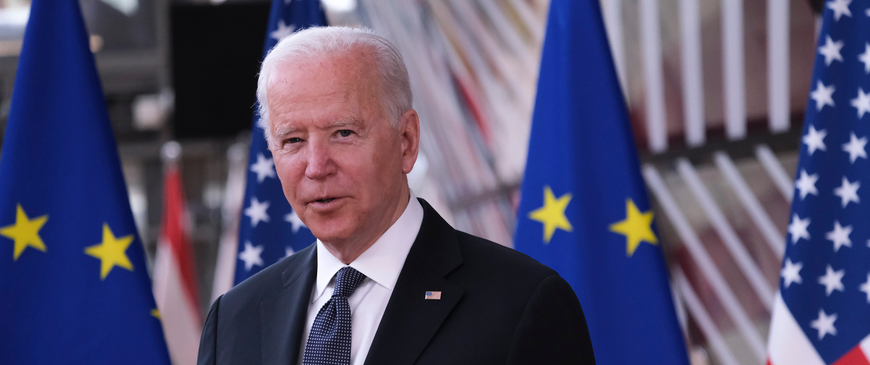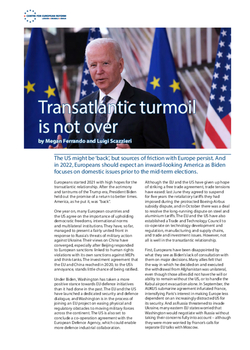
Transatlantic turmoil is not over
The US might be ‘back’, but sources of friction with Europe persist. And in 2022, Europeans should expect an inward-looking America as Biden focuses on domestic issues prior to the mid-term elections.
Europeans started 2021 with high hopes for the transatlantic relationship. After the acrimony and tantrums of the Trump era, President Biden held out the promise of a return to better times. America, as he put it, was "back".
One year on, many European countries and the US agree on the importance of upholding democratic freedoms, international norms and multilateral institutions. They have, so far, managed to present a fairly united front in response to Russia’s threats of military action against Ukraine. Their views on China have converged, especially after Beijing responded to European sanctions linked to human rights violations with its own sanctions against MEPs and think-tanks. The investment agreement that the EU and China reached in 2020, to the US’s annoyance, stands little chance of being ratified.
Under Biden, Washington has taken a more positive stance towards EU defence initiatives than it had done in the past. The EU and the US have launched a dedicated security and defence dialogue, and Washington is in the process of joining an EU project on easing physical and regulatory obstacles to moving military forces across the continent. The US is also set to conclude a co-operation agreement with the European Defence Agency, which could enable more defence industrial collaboration.
Although the EU and the US have given up hope of striking a free trade agreement, trade tensions have eased: last June they agreed to suspend for five years the retaliatory tariffs they had imposed during the protracted Boeing-Airbus subsidy dispute, and in October there was a deal to resolve the long-running dispute on steel and aluminium tariffs. The EU and the US have also established a Trade and Technology Council to co-operate on technology development and regulation, manufacturing and supply chains, and trade and investment issues. However, not all is well in the transatlantic relationship.
Europeans have been disappointed by what they see as Biden’s lack of consultation with them on major decisions.
First, Europeans have been disappointed by what they see as Biden’s lack of consultation with them on major decisions. Many allies felt that the way in which he decided on and executed the withdrawal from Afghanistan was unilateral, even though those allies did not have the will or ability to remain without the US, or to handle the Kabul airport evacuation alone. In September, the AUKUS submarine agreement infuriated France, intensifying Paris's interest in making Europe less dependent on an increasingly distracted US for its security. And as Russia threatened to invade Ukraine, many eastern EU states worried that Washington would negotiate with Russia without taking their concerns fully into account – although they were more worried by France’s calls for separate EU talks with Moscow.
Second, there are substantive policy disagreements that will continue to cause transatlantic friction. The EU and the US are often economic competitors, and each side worries that the other is becoming more protectionist. Many Europeans see Biden’s ‘foreign policy for the middle class’ as a cover for protectionist policies. And the EU’s plan to introduce a carbon border adjustment mechanism worries US exporters, since it will impose additional costs on them, to help the EU avoid carbon leakage. Meanwhile, the EU’s efforts to enhance its digital and technological sovereignty and to rein in the anti-competitive practices of (mainly US) digital platforms will continue to be an irritant. In the security field, the US could quickly sour on the EU assuming a larger role in defence matters if EU countries do not follow through with plans to improve their defence capabilities, or if their plans threaten to undermine NATO. Indeed, the EU and the US will have to work hard to avoid disagreements over the respective roles of NATO and the EU, both of which will release strategic documents this year.
As China and Russia embark on increasingly disruptive foreign policies and draw closer to each other, the need for a unified transatlantic stance is more pressing than ever. But it will not be easy to achieve. Europeans have become more concerned about China’s policies, but many think that isolating Beijing is unhelpful. If the US pushes Europe to take a much harder stance on China, this will probably lead to more divisions, within Europe and across the Atlantic. Until now, Russian aggression has united Europe and America and appears to have re-invigorated NATO. But if Russia were to take military action against Ukraine, divisions over how to respond might drive a wedge between the US and Europe – especially if some EU states, constrained by public opinion and energy dependency on Russia, prove unwilling to impose the sweeping sanctions that the US (and most eastern EU countries) envisage.
Europeans also look with growing concern to domestic developments in the US, where Trumpism seems to be growing stronger. Recent polling by the University of Massachusetts suggests that 71 per cent of Republican voters believe Biden only won the election through cheating. A December poll by Gallup indicates that Biden’s approval rating stands at 43 per cent – a sharp drop since the start of his term. And the few anti-Trump Republicans, like Liz Cheney, have either been disavowed by their party or are not standing for re-election in November, when Americans vote in mid-term elections. Current polling indicates that Republicans are likely to make large gains, depriving Democrats of their narrow majorities in the House and the Senate, and essentially putting an end to Biden’s domestic reform agenda. Nineteen Republican-governed states have been complicating the voting process for their residents by reducing the number of polling stations, redrawing voting districts and abolishing postal voting. This will boost the Republicans’ chances.
To avoid defeat at the mid-term elections, Democrats will need to persuade voters that they are delivering on their promise to make America stronger and fairer. But one year after taking office, Biden’s $1.75 trillion ‘build back better’ plan, supposed to drive the recovery from the pandemic and make the US a leader in the fight against climate change, is still stuck in the Senate. Legislation to counter voter suppression, another of Biden’s priorities, has not made it past the Senate either.
Europeans should expect Biden to be more focused on domestic priorities in 2022.
All this means that Europeans should expect Biden to be more focused on domestic priorities in 2022. The US will not ignore major foreign policy crises if they arise, but Europeans should expect limited help from Washington in dealing with challenges that affect them more than the US, whether that is trouble in Bosnia, renewed tensions in the eastern Mediterranean, a rekindling of the civil war in Libya, or instability in the Sahel. Biden’s focus on domestic policy will weaken US influence and may encourage further foreign policy adventurism by Moscow and Beijing. And if the Republicans gain control of Congress at the end of the year, this will constrain Biden’s room for manoeuvre in foreign policy. A Republican-controlled Congress could push Biden towards foreign policy positions that create friction with Europe and make a united transatlantic stance harder, for example over China, Iran or Russia.
Europeans will soon find out exactly how long Biden’s America is likely to be back for. In the meantime, they should invest in their capacity to protect their interests, whatever Washington does.
Megan Ferrando is the Clara Marina O'Donnell fellow (2021-22), Centre for European Reform
Luigi Scazzieri is a senior research fellow, Centre for European Reform

